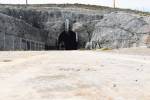Congress cuts 22 percent from project
WASHINGTON -- Congress is taking another deep bite out of Yucca Mountain spending in a final budget bill it plans to pass this week, raising the possibility of even more delays in the government's bid for a nuclear waste site in Nevada.
Energy Department officials could not immediately detail the possible effects to the planned national repository from a 22 percent cut in the bill that was made public on Monday.
The project's director, Ward Sproat, said last week that deep cuts could cause DOE to rethink its once inviolate goal of filing a repository license application by the end of next June, which would be a big step forward for the often troubled effort.
Although President Bush budgeted Yucca for $494.5 million in fiscal 2008, lawmakers allocated no more than $386.5 million in a year-end wrapup bill that would keep the government funded through next September, according to the office of Sen. Harry Reid, D-Nev.
Sproat said last week that a $100 million reduction "would be very serious," but he could not detail what the outcome could be.
Lawmakers on the House and Senate appropriations committees who authored the budget bill think the Yucca project likely will be held up.
Along with cutting back the Nevada project, the bill also calls for an $8.2 million reduction in a waste account at the Nuclear Regulatory Commission, "given the almost certain delay in the Department of Energy filing a license application for the Yucca Mountain repository."
In the meantime, the bill also calls for the Department of Energy to devise plans to take custody of nuclear waste stored at decommissioned reactors, consolidating the material at a federal site, an active reactor or some volunteer interim location.
There are 14 shut-down reactors in nine states, according to the Nuclear Regulatory Commission.
The bill also contains $5 million in funding for the state of Nevada to monitor the Yucca project, $1 million for Nye County and $9 million to be split among Clark County and other local governments affected by the project.
The $516 billion year-end spending bill marked the 13th consecutive year that Congress has reduced a president's budget for the Yucca project. In that period, repository spending has been reduced a combined $1.3 billion. DOE officials have blamed underfunding for missed deadlines and near-constant scrambling to reprioritize segments of the complex science and transportation program.
On the other hand, critics of Yucca Mountain on Monday cheered the latest whacking, including Reid, who has used his influence to slow the project and did so again this year.
"I am proud that I was successful in cutting from Yucca's budget," Reid said in a statement. "It is clear that the Yucca Mountain Project is a dying beast and I hope that this cut in funding will help drive the final nail into its coffin."
"This is another battle we have won, but we still have a war to fight toward killing it once and for all," said Rep. Jon Porter, R-Nev.
"The White House is in a mad rush to move forward on the license for Yucca Mountain by next summer, regardless of the danger, and I hope this cut will slow their reckless drive," said Rep. Shelley Berkley, D-Nev.
Nevada officials charge the planned repository for 77,000 tons of high-level spent nuclear fuel and other forms of highly radioactive waste will pose threats to the health and safety of residents.
DOE officials say a 7,000-page licensing package it plans to submit to the Nuclear Regulatory Commission should show that the repository could be operated safely.
Fights over funding serve only to delay safety reviews of the Yucca project, said Martez Norris, executive director of the Nuclear Waste Strategy Coalition. In the meantime, electricity ratepayers continue to pay $750 million annually into a special repository construction fund that has not been fully tapped.
"We are disappointed this program is not being protected," said Norris, whose group consists of power company executives and utility officials in states where nuclear waste is now stored.
"Members of Congress whose ratepayers are paying into the fund are not protecting their states," Norris said. "That waste is going to stay stranded in their states."
More about Yucca Mountain























